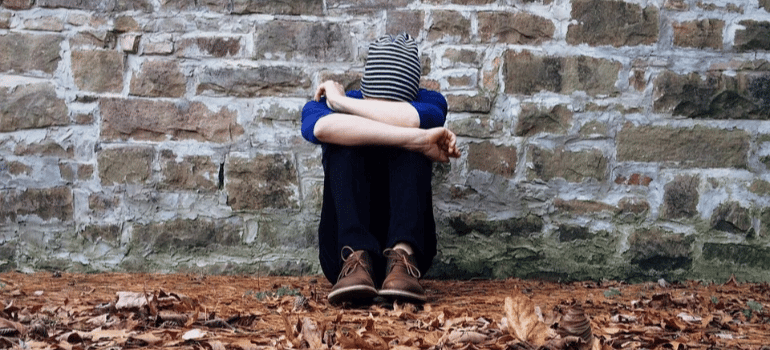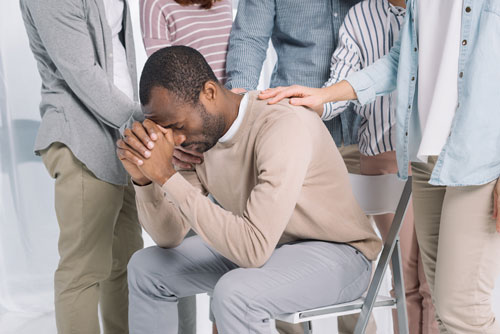Depression affects millions of people a year. Many people who suffer from depression do so without anyone around them even knowing. Unfortunately, because such people hide their depression, they don’t get the help that they need. Oftentimes, people suffering from depression will turn to drugs or alcohol as a way to self-medicate and feel better. This can lead to the development of an addiction issue on top of depression. On this page, we will discuss the different types of depression. We’ll also discuss the dangers of substance abuse as it relates to depression. You’ll even learn how to help someone with drug addiction and depression.
What Is Depression?
On a daily basis, people experience a variety of highs and lows. That is to be expected and is perfectly normal. When such emotions are a problem though is when the lows last for days, weeks, or even months at a time and there are no highs. This, in a nutshell, is what depression is. Depression not only affects a person’s overall mood. Depression can also have an adverse effect on a person’s ability to complete normal and basic daily activities such as go to work, take a shower, or even eat.
People who suffer from depression often feel sad and lonely. These feelings can then lead to people with depression pulling back or isolating themselves from friends, family, and loved ones.
Alone, miserable, and with no end in sight, people with depression might then find themselves turning to drugs or alcohol for a sense of relief. After all, such people are just looking for something that will make them feel better and feel normal again. While substance abuse might provide people with depression with temporary relief in the short term, long term it can lead to even more severe depression, health issues, and addiction.
What Are The Different Types of Depression?
Depression comes in many different forms. Understanding the different types of depression can help you identify if you or someone you know might be suffering from this mental illness.
Major Depression
Major depression is one of if not the most common type of depression. In fact, major depression affects roughly 5-7% of the population in the United States at any given time. Those suffering from this type of depression may experience extreme sadness, irritability, lack of energy or motivation, and changes in sleeping patterns that can last weeks at a time.
Seasonal Affective Disorder
As the name implies, seasonal affective disorder is a seasonal depression that usually comes on in the wintertime. People who suffer from seasonal affective disorder tend to live in colder weather environments. They also tend to live in places that get very little sunlight in the winter.
Those suffering from SAD tend to show signs of mood changes, anxiety, sleep problems, and eating problems. In order to be diagnosed with seasonal affective disorder, a person has to exhibit symptoms over three consecutive winters.
Atypical Depression
When someone suffers from atypical depression, they experience all the same symptoms that someone with major depression will. The big difference is that someone with atypical depression can have their mood elevated when something positive happens.
Unfortunately, though, the “lows” associated with atypical depression can cause a person to have suicidal thoughts or actions. Someone who has atypical depression and turns to drugs or alcohol may suffer from detrimental emotional and behavioral problems.
Dysthymia
Dysthymia is largely considered to be a mild form of depression. People who have dysthymia tend to be in a gloomy mood or “bummed out” for years at a time.
Drugs or alcohol might seem like a short-term solution when it comes to dealing with dysthymia. Dysthymia can have long-term negative consequences though. It can even lead to major depression.
Postpartum Depression
While having a baby can be a wonderful and joyous experience for many, for the mother, the transition into becoming a mom can cause significant emotional issues and even depression. Postpartum depression affects as much as 16% of all new mothers every year.
Postpartum depression can be caused by things like nutritional deficiencies, hormonal imbalances, and exposure to chemical toxins. This form of depression is also more common in women who have a history of depression, are under a lot of stress, or don’t have the proper amount of support needed to care for the child.
What Are Some of the Signs and Symptoms of Depression?
Understanding the signs and symptoms of depression can be the difference between someone you know getting the help that he or she needs and not. It’s also important to remember that symptoms of depression can vary based on the type of depression and the person who is suffering. If a person is suffering from depression and addiction, the severity of their symptoms can sometimes be more extreme.
Some of the more common signs and symptoms of depression include:
- Trouble sleeping
- Irritability
- Loss of interest in activities
- Changes in eating habits
- Changes in weight
- Trouble concentrating
- Feeling down about yourself
- Feeling useless or hopeless
- Suicidal thoughts or actions
- Reckless behavior
- Turning to drugs or alcohol
- Fatigue
When left untreated, the symptoms associated with depression can lead to severe medical issues, addiction, and even death. That’s why it’s so crucial to get help for depression right away.
What Is the Connection Between Depression and Addiction?
Many people who suffer from depression don’t seek out the help that they need to treat their issues. They might be embarrassed or they might have convinced themselves that they are fine and don’t have depression.
As a result, many of these people turn to drugs and/or alcohol as a way to self-medicate and feel better. Once such people develop drug use problems and their loved ones begin to also notice their depressive ways, the people that love them are going to start wondering how to help someone with drug addiction and depression.
Regardless of the order in which one developed depression and drug addiction, when a person suffers from both of these disorders, that person is said to have a co-occurring disorder. A co-occurring disorder occurs when someone is suffering from a substance addiction and a mental health condition simultaneously.
When a person is suffering from a co-occurring disorder, it’s crucial to get him or her help from a rehab facility that provides treatment for co-occurring disorders. This is because only treating one illness within a co-occurring disorder at a time isn’t effective and can oftentimes lead to relapse.
What Treatment Options Are Available For Depression and Addiction?
No matter how bad things might have gotten, it’s important to remember that it’s never too late to get help for depression and addiction. When picking a place to go for treatment for depression and drug addiction it’s important to pick a treatment facility that specializes in treating co-occurring disorders.
When someone is suffering from depression and addiction, both need to be treated at the same time, especially since they are so intertwined. The first step in the treatment process for depression and addiction is to enter into detox. That way you can rid the body of any and all harmful substances. Without doing this, the recovery process cannot truly begin.
It’s important to detox under the care and supervision of trained medical professionals. This is due to the nature of detox and the side effects associated with it.
Detox should be done at either a local medical facility, a dedicated detox center, or a treatment center that also offers detox services such as Harmony Ridge Recovery Center. Once detox has been completed, the next step is to enter into a treatment program. For those suffering from a co-occurring disorder, there are special treatment programs that are designed to treat mental and substance conditions at the same time.
One of the most successful treatments for a co-occurring disorder is cognitive-behavioral therapy or CBT. This is because CBT can address the thoughts and actions that not only led to depression but addiction as well.
During cognitive-behavioral therapy, the person in therapy identifies his or her negative thoughts, emotions, and actions and learns how to replace them with more positive thoughts, emotions, and actions. The therapist during CBT will also help teach the patient some healthy coping mechanisms to replace his or her unhealthy ones, such as abusing substances.
How To Help Someone With Drug Addiction and Depression
Here at Harmony Ridge, we specialize in treating those suffering from co-occurring disorders. In addition, we also treat people with either just a mental health condition or an addiction issue.
In addition to the more traditional treatment methods such as CBT, and individual, and group therapy, we here at Harmony Ridge also offer a variety of alternative and holistic therapies and treatments such as:
If you know someone who is suffering and you want to learn how to help someone with drug addiction and depression, contact us here at Harmony Ridge. That way we can use our specialized co-occurring disorder treatment programs to help treat the individual.
Remember, if you ever find yourself suffering from depression and addiction, you must get help right away. Contact us today to learn about our treatment options and how we can get you the help that you need.







